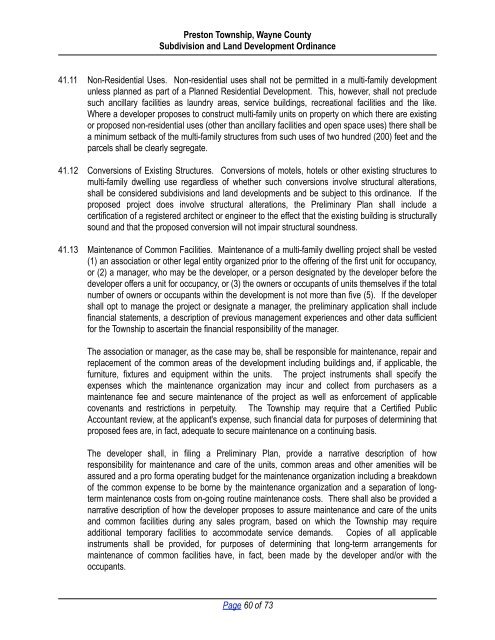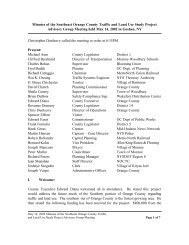Preston Township Wayne County - Shepstone Management Company
Preston Township Wayne County - Shepstone Management Company
Preston Township Wayne County - Shepstone Management Company
You also want an ePaper? Increase the reach of your titles
YUMPU automatically turns print PDFs into web optimized ePapers that Google loves.
<strong>Preston</strong> <strong>Township</strong>, <strong>Wayne</strong> <strong>County</strong><br />
Subdivision and Land Development Ordinance<br />
41.11 Non-Residential Uses. Non-residential uses shall not be permitted in a multi-family development<br />
unless planned as part of a Planned Residential Development. This, however, shall not preclude<br />
such ancillary facilities as laundry areas, service buildings, recreational facilities and the like.<br />
Where a developer proposes to construct multi-family units on property on which there are existing<br />
or proposed non-residential uses (other than ancillary facilities and open space uses) there shall be<br />
a minimum setback of the multi-family structures from such uses of two hundred (200) feet and the<br />
parcels shall be clearly segregate.<br />
41.12 Conversions of Existing Structures. Conversions of motels, hotels or other existing structures to<br />
multi-family dwelling use regardless of whether such conversions involve structural alterations,<br />
shall be considered subdivisions and land developments and be subject to this ordinance. If the<br />
proposed project does involve structural alterations, the Preliminary Plan shall include a<br />
certification of a registered architect or engineer to the effect that the existing building is structurally<br />
sound and that the proposed conversion will not impair structural soundness.<br />
41.13 Maintenance of Common Facilities. Maintenance of a multi-family dwelling project shall be vested<br />
(1) an association or other legal entity organized prior to the offering of the first unit for occupancy,<br />
or (2) a manager, who may be the developer, or a person designated by the developer before the<br />
developer offers a unit for occupancy, or (3) the owners or occupants of units themselves if the total<br />
number of owners or occupants within the development is not more than five (5). If the developer<br />
shall opt to manage the project or designate a manager, the preliminary application shall include<br />
financial statements, a description of previous management experiences and other data sufficient<br />
for the <strong>Township</strong> to ascertain the financial responsibility of the manager.<br />
The association or manager, as the case may be, shall be responsible for maintenance, repair and<br />
replacement of the common areas of the development including buildings and, if applicable, the<br />
furniture, fixtures and equipment within the units. The project instruments shall specify the<br />
expenses which the maintenance organization may incur and collect from purchasers as a<br />
maintenance fee and secure maintenance of the project as well as enforcement of applicable<br />
covenants and restrictions in perpetuity. The <strong>Township</strong> may require that a Certified Public<br />
Accountant review, at the applicant's expense, such financial data for purposes of determining that<br />
proposed fees are, in fact, adequate to secure maintenance on a continuing basis.<br />
The developer shall, in filing a Preliminary Plan, provide a narrative description of how<br />
responsibility for maintenance and care of the units, common areas and other amenities will be<br />
assured and a pro forma operating budget for the maintenance organization including a breakdown<br />
of the common expense to be borne by the maintenance organization and a separation of longterm<br />
maintenance costs from on-going routine maintenance costs. There shall also be provided a<br />
narrative description of how the developer proposes to assure maintenance and care of the units<br />
and common facilities during any sales program, based on which the <strong>Township</strong> may require<br />
additional temporary facilities to accommodate service demands. Copies of all applicable<br />
instruments shall be provided, for purposes of determining that long-term arrangements for<br />
maintenance of common facilities have, in fact, been made by the developer and/or with the<br />
occupants.<br />
Page 60 of 73




